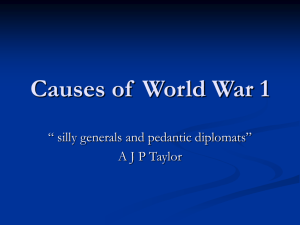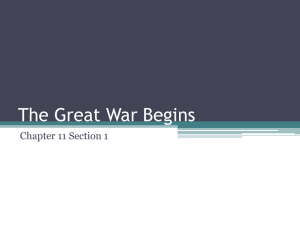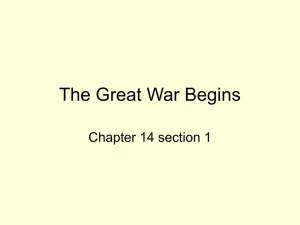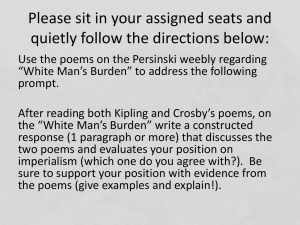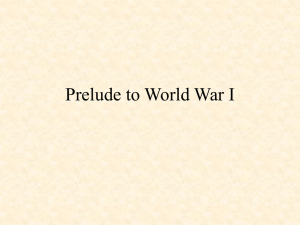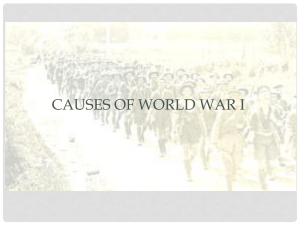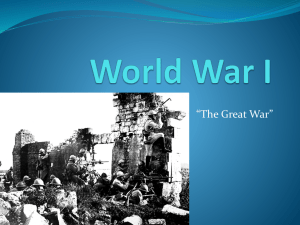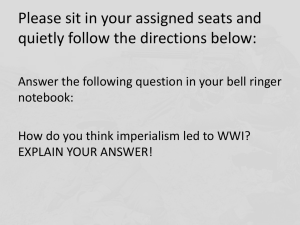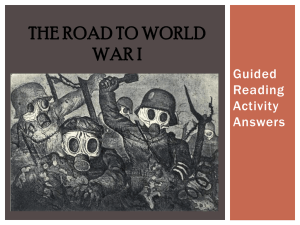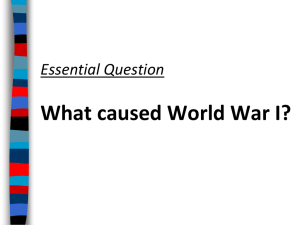Causes of World War 1
advertisement
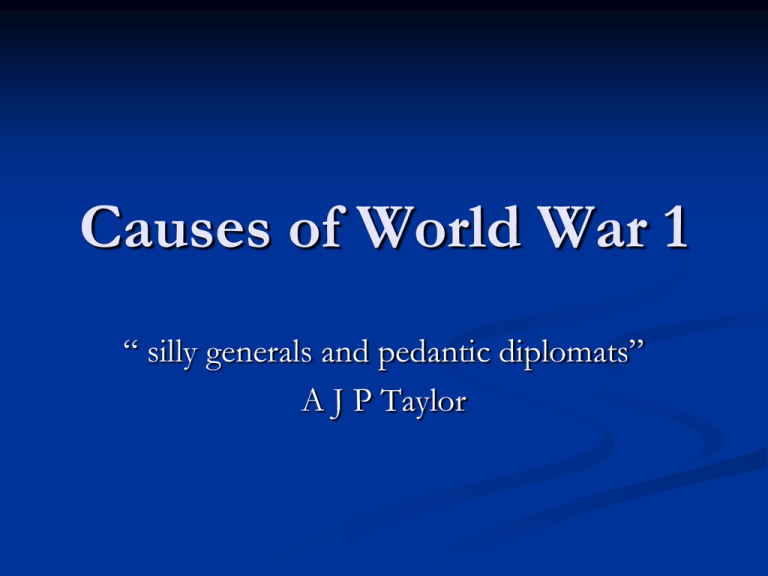
Causes of World War 1 “ silly generals and pedantic diplomats” A J P Taylor 1879 The Dual Alliance 1881 Austro-Serbian Alliance Germany and AustriaHungary made an alliance to protect themselves from Russia Austria-Hungary made an alliance with Serbia to stop Russia gaining control of Serbia Russia formed an alliance with France to protect herself against Germany and AustriaHungary Britain, Russia and France agreed not to sign for peace separately. This was made between Russia, France and Britain to counter the increasing threat from Germany. Germany and AustriaHungary made an alliance with Italy to stop Italy from taking sides with Russia 1894 Franco-Russian Alliance 1914 Triple Entente (no separate peace) 1907 Triple Entente 1882 The Triple Alliance 1907 Anglo-Russian Entente This was an agreement between Britain and Russia 1904 Entente Cordiale This was an agreement, but not a formal alliance, between France and Britain. An Historians View- Robert Wolfsen “Countries sought and made allies for defensive purposes and the settlement of outstanding disputes between them…..they were not , openly formed for offensive purposes to harm or attack other countries.” Years of Change Alliance System The Tangled Web- Identify the countries/personalities depicted? Imperialism Lenin famously asserted that the worldwide system of imperialism was responsible for the war Imperialism Imperialism is when a country takes over new lands or countries and makes them subject to their rule. By 1900 the British Empire extended over five continents and France had control of large areas of Africa. With the rise of industrialism countries needed new markets. The amount of lands 'owned' by Britain and France increased the rivalry with Germany who had entered the scramble to acquire colonies late and only had small areas of Africa A Slice of the African Cake Militarism Militarism means that the army and military forces are given a high profile by the government. The growing European divide had led to an arms race between the main countries. The armies of both France and Germany had more than doubled between 1870 and 1914 and there was fierce competition between Britain and Germany for mastery of the seas. The British had introduced the 'Dreadnought', an effective battleship, in 1906. The Germans soon followed suit introducing their own battleships. The German, Von Schlieffen also drew up a plan of action that involved attacking France through Belgium if Russia made an attack on Germany. The map below shows how the plan was to work. Schlieffen Plan Comparative figures on army increase, 1870-1914: 1870 1914 Russia 700,000 1,300,000 France 380,000 846,000 Germany 403,000 812,000 Austria-Hungary 247,000 424,000 Britain 302,000 381,000 Italy 334,000 305,000 Japan 70,000 250,000 U.S.A. 37,000 98,000 Arms Race HMS DREADNOUGHT Nationalism Nationalism means being a strong supporter of the rights and interests of one's country. The Congress of Vienna, held after Napoleon's exile to Elba, aimed to sort out problems in Europe. Delegates from Britain, Austria, Prussia and Russia (the winning allies) decided upon a new Europe that left both Germany and Italy as divided states. Strong nationalist elements led to the reunification of Italy in 1861 and Germany in 1871. The settlement at the end of the Franco-Prussian war left France angry at the loss of Alsace-Lorraine to Germany and keen to regain their lost territory. Large areas of both Austria-Hungary and Serbia were home to differing nationalist groups, all of whom wanted freedom from the states in which they lived. Flashpoint Moroccan Crisis In 1904 Morocco had been given to France by Britain, but the Moroccans wanted their independence. In 1905, Germany announced her support for Moroccan independence. War was narrowly avoided by a conference which allowed France to retain possession of Morocco. However, in 1911, the Germans were again protesting against French possession of Morocco. Britain supported France and Germany was persuaded to back down for part of French Congo. Flashpoint Bosnian Crisis In 1908, Austria-Hungary took over the former Turkish province of Bosnia. This angered Serbians who felt the province should be theirs. Serbia threatened Austria-Hungary with war, Russia, allied to Serbia, mobilised its forces. Germany, allied to Austria-Hungary mobilised its forces and prepared to threaten Russia. War was avoided when Russia backed down. There was, however, war in the Balkans between 1911 and 1912 when the Balkan states drove Turkey out of the area. The states then fought each other over which area should belong to which state. Austria-Hungary then intervened and forced Serbia to give up some of its acquisitions. Tension between Serbia and AustriaHungary was high. Political Tensions There is no single explanation for the apparent willingness of the nations of Europe to go to war in 1914. The political tensions that preceded the war, however is often said to be caused by the following factors; Colonial rivalry Economic rivalry The arms race French and German hostilities European military alliances Nationalism Critical Flashpoint Archduke Franz Ferdinand's Assassination, 28 June 1914 The assassination of Archduke Franz Ferdinand, heir to the AustroHungarian throne, on 28 June 1914, set in train a series of diplomatic events that led inexorably to the outbreak of war in Europe at the end of July 1914. Ferdinand - and his wife Sophie - were killed by Serb nationalist Gavrilo Princip while on a formal visit to Sarajevo. Princip shot Ferdinand at point blank range while the latter was travelling in his car from a town hall reception, having earlier that day already survived one assassination attempt Allies Britain ( and its Empire ) France Russia Belgium Italy Serbia Portugal Japan and other minor participants Central Powers Germany Austria Hungary Ottoman-Turkey Bulgaria Countdown to World War June 1914 Franz Duke Ferdinand, heir to the Austrian throne assassinated 28th July Austria Hungary declare war on Serbia. France and Russia back Serbia 30th July Britain and Russia mobilize forces 1st August Germany declares war on Russia 2nd August Germany invades Belgium, declares war on France 4th August Britain declares war on Germany Student Research “Whatever happens, Australia is a part of the Empire right to the full. Remember that when Australia is at war, so is Australia at war.” Prime Minister Cook


